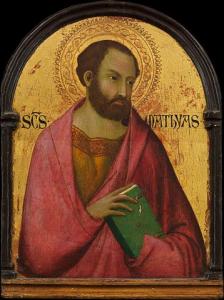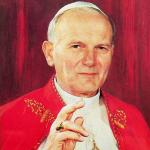[originally posted on 5-26-23 on Facebook]
***
Luke cites Psalms 108:8 in Acts 1:20: “His office let another take.” The Greek for “office” is episkopé (Strong’s word #1984): the word for “bishop” and the root of “episcopal.” Thayer’s Greek Concordance writes about its use in this passage:
*
c. after the analogy of the Hebrew פְּקֻדָּה (Numbers 4:16; 1 Chronicles 24:19 (here the Sept. ἐπίσκεψις), etc.), oversight i. e. overseership, office, charge; Vulg. episcopatus: Acts 1:20, from Psalm 108:8; specifically, the office of a bishop (the overseer or presiding officer of a Christian church): 1 Timothy 3:1, and in ecclesiastical writings
*
In KJV, it’s translated “bishoprick” at Acts 1:20 and “bishop” at 1 Timothy 3:1. This clinches the case for apostolic succession from the Bible itself, since Judas was in effect called a bishop or elder, and this is the office that Matthias would assume, and which would be perpetual throughout Church history. The cognate episkopos (Strong’s word #1985) is defined by Strong (with obvious Protestant bias — not wanting to say the word “bishop”), as “overseer, supervisor, ruler, especially used with reference to the supervising function exercised by an elder or presbyter of a church or congregation.”
*
That’s still quite sufficient, however, to make the argument for apostolic succession. The word appears five times in the NT. KJV translates it as “bishop(s)” four out of five times, and “overseer” in the remaining appearance. If we consult English translations for 1 Timothy 3:2, which has episkopos, we see that bishops is used 26 times in one particular listing, while “overseer” also appears 26 times, “leader” eight times, and “elder” twice. No problem for the Catholic and larger “episcopal Church government” view. “Overseer” and “leader” are synonyms for “bishop” anyway.
*
*
Moreover, Acts 1:25 states that Matthias would “take the place in this ministry . . . from which Judas turned aside.” The word there is diakonia (Strong’s word #1248): from which deacon derives (Acts 1:17 applies the same word to Judas, too). It’s usually translated “ministry” in English translations, and the same word is applied to Christian work of non-apostles (e.g., Acts 6:4; 1 Cor 12:5: “varieties of service”; 1 Cor 16:15: “the household of Stephanas . . . have devoted themselves to the service of the saints”).
*
*
Hence, the NT teaches a transition from apostles to bishops and deacons and elders . . . There was only one Apostle Paul, too, yet he appears to pass on his office in some sense to Timothy:
*
*
2 Timothy 1:6, 11, 13-14 (RSV) Hence I remind you to rekindle the gift of God that is within you through the laying on of my hands; . . . [11] For this gospel I was appointed a preacher and apostle and teacher, . . . [13] Follow the pattern of the sound words which you have heard from me, in the faith and love which are in Christ Jesus; [14] guard the truth that has been entrusted to you by the Holy Spirit who dwells within us.
*
2 Timothy 2:2 and what you have heard from me before many witnesses entrust to faithful men who will be able to teach others also.
*
2 Timothy 4:1-2 I charge you in the presence of God and of Christ Jesus who is to judge the living and the dead, and by his appearing and his kingdom: [2] preach the word, be urgent in season and out of season, convince, rebuke, and exhort, be unfailing in patience and in teaching.
*
Most anti-Catholic polemicists are unfamiliar with the entire classical argument from Matthias for apostolic succession and never delve into the relevant Greek words, as I did above. Our argument is thoroughly, deeply biblical; theirs is only biblical in a superficial, “surfacey” sense. We see this again and again in anti-Catholic polemics. They pick-and-choose. We go deep and incorporate all relevant cross-references.
*
Practical Matters: Perhaps some of my 4,300+ free online articles (the most comprehensive “one-stop” Catholic apologetics site) or fifty-three books have helped you (by God’s grace) to decide to become Catholic or to return to the Church, or better understand some doctrines and why we believe them.
*
Or you may believe my work is worthy to support for the purpose of apologetics and evangelism in general. If so, please seriously consider a much-needed financial contribution. I’m always in need of more funds: especially monthly support. “The laborer is worthy of his wages” (1 Tim 5:18, NKJV). 1 December 2021 was my 20th anniversary as a full-time Catholic apologist, and February 2022 marked the 25th anniversary of my blog.
*
PayPal donations are the easiest: just send to my email address: [email protected]. You’ll see the term “Catholic Used Book Service”, which is my old side-business. To learn about the different methods of contributing, including 100% tax deduction, etc., see my page: About Catholic Apologist Dave Armstrong / Donation Information. Thanks a million from the bottom of my heart!
***
Photo credit: Saint Matthias (c. 1317-1319), by Simone Martini (1284-1344) [public domain / Wikimedia Commons]
***
Summary: Acts 1:20 is perhaps the best biblical proof of apostolic succession. St. Matthias was chosen to replace Judas, & the word episkopé (“bishop”) is specifically used.













